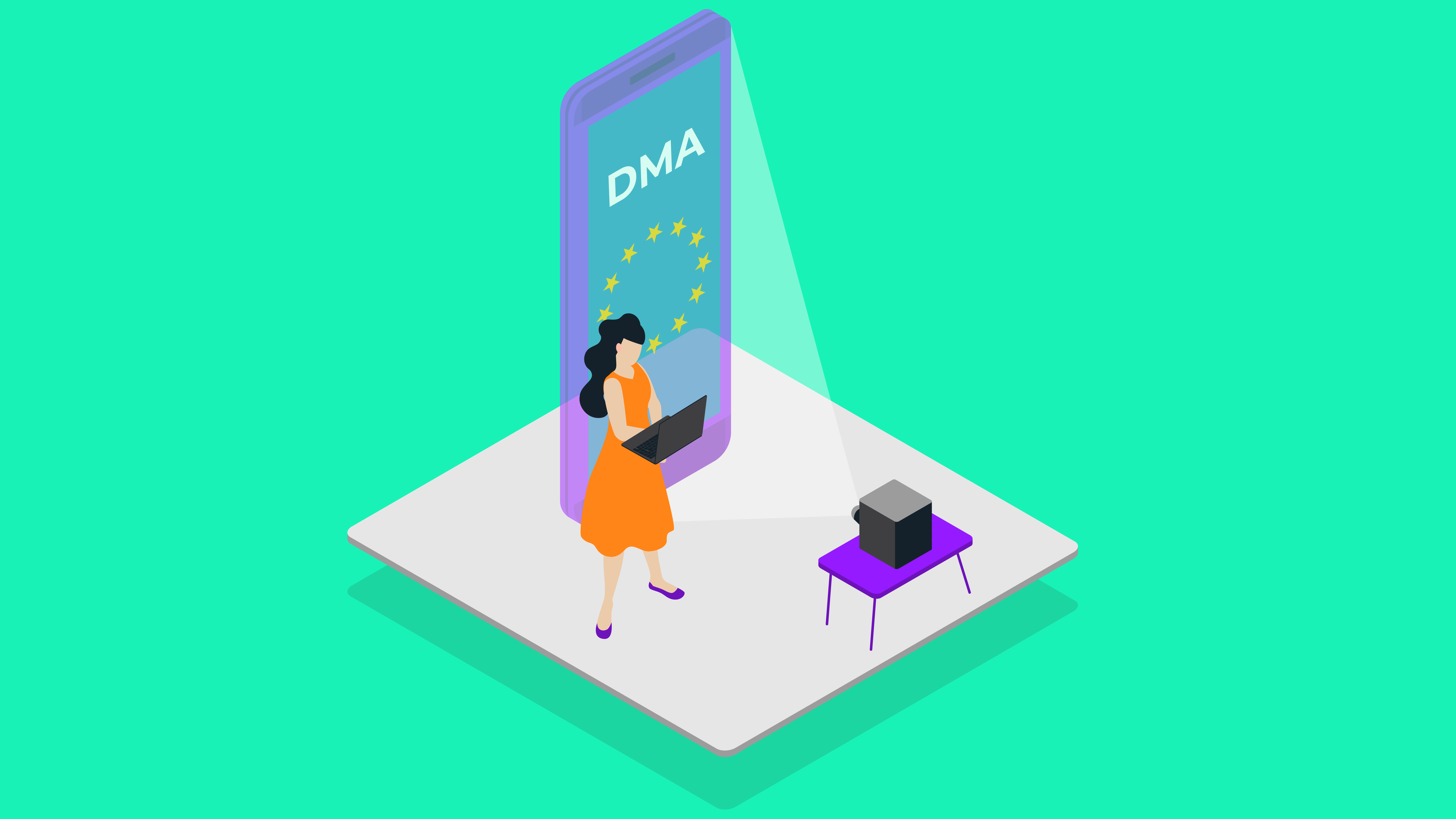The Digital Markets Act (DMA), an ex bet European Association change of computerized rivalry rules, will be in force today, by 12 PM Brussels' time, on six tech goliaths — applying another arrangement of legitimate prerequisites on more than 20 of their "center stage administrations" (CPS).
Online realms that scaled in a time of negligible mediations from controllers, molding the business web as far as we might be concerned, are currently confronting a prescriptive arrangement of rules on how they can work and carry on with work in the EU, remembering hard cutoff points for their utilization of information; interoperability orders; and restrictions on self-preferencing.
The six organizations assigned under the DMA up until this point — as purported Web "guards" — are: Letter set, Amazon, Apple, ByteDance, Meta and Microsoft.
Peruse on for an outline of the new regulation, its initial effects on stages and Large Tech, and how it could change computerized business as far as we might be concerned, beginning in Europe…
Rules of the road for gateways

The point of the dish EU guideline is — basically — to air out Large Tech's market power. The DMA shoots to make Digital Markets more pleasant and more contestable by applying a bunch of direct front commitments and limitations on the top dog players dug in on advanced markets. For example, — for instance — a prohibition on Google's self-preferencing in list items; or on Amazon utilizing opponents' information to take care of its own retail item improvement; or on Meta handling client information for promotion focusing without individuals' assent; or a restriction on Apple prohibiting outsider application stores from its versatile stage, iOS.
Information compactness and interoperability are key boards of the system — which additionally, for instance, requires Meta to open up its WhatsApp and Courier stages to equal administrations to permit cross-stage access. Thought being more modest informing applications can offer their clients the capacity to contact individuals utilizing those predominant informing networks without pursuing a record with their guardian.
EU officials by and large believe the DMA should cultivate administration exchanging and "multihoming" to decrease Enormous Tech's hold on web clients' eyeballs and wallets, opening the opportunity for contenders to get a thoroughly search in. Put another way, the peculiarity of online administrations developing into self-supporting environments and domains, through network impacts and watchman secure in strategies, is the outward power the DMA is going after with a scope of favorable to contest countermeasures designated at vital doors, as application stores, working frameworks and internet browsers.
Whether the guideline will really prevail with regards to releasing predominant stage administrators' hold on advanced markets is questionable. Yet, the EU will attempt.
The fundamental DMA measures for a stage being considered an "significant entryway" for business clients to arrive at end clients, and whose settled in proprietor/administrator has a "huge effect" on the EU's inward market, is yearly income of something like 7.5 billion in every one of the last three monetary years or a market cap of no less than 75 billion in the last monetary year. A watchman should likewise give a similar CPS in no less than three EU Part States; and these stages should have no less than 45 million month to month dynamic clients locally and no less than 10,000 business clients.
The coalition has offered itself some leeway to assign "arising" guards, as well — assuming the Commission accepts a stage will acquire a dug in and sturdy market position soon it can likewise force a few principles, fully intent on forestalling that result.
The DMA's sizeable aspiration is upheld with serious teeth, as well: The guideline considers punishments of up to 10% of worldwide yearly turnover for breaks — or even 20% for rehash offenses. So we're talking fines that could race to a huge number of dollars each.
Oversight and authorization obligation is concentrated with the European Commission. This is an endeavor to smooth out authorization and stay away from the sketchy results we've seen with other EU advanced guidelines, because of variable resourcing and gathering shopping. Anyway this approach heaps complicated and high stakes work on the EU's leader — so one inquiry is whether the alliance could have gone overboard?
The DMA considers private implementation, as well, as prosecution focusing on resistance — so guardians could confront being sued in European courts over out of line rehearses on the off chance that they neglect to keep up.
Which platforms are regulated?
Presently, the six watchmen's managed CPS length various techno battlegrounds — specifically: Informal communities (TikTok, Facebook, Instagram, LinkedIn); "intermediation" administrations (Google Guides, Google Play, Google Shopping, Amazon Commercial center, iOS Application Store, Meta Commercial center); promotions conveyance frameworks (Google, Amazon and Meta); programs (Chrome, Safari); working frameworks (Google Android, iOS, Windows PC operating system); N-IICS or Number-Autonomous Relational Correspondence Administrations (WhatsApp, Facebook Courier); web crawlers (Google); and video sharing stages (YouTube).
The guideline considers CPS to be assigned in other tech fields as well, for example, distributed computing administrations and menial helpers. However, up until this point none have been named in those spaces — and distributed computing is one striking early hole (particularly given the job hyperscalers like Microsoft are playing in the quick creating generative man-made intelligence market).

Gotten some information about the distributed computing assignment hole, the Commission let us know the DMA is based on an arrangement of self-evaluation which expects stages to tell it when they consider they meet the guideline's edges — which no cloud administrator has so far finished.
"At this stage we don't have components to scrutinize this self-appraisal," the Commission representative said, adding they will "keep on checking market improvements" in cloud — and furthermore underlining the ongoing count of six guards (and 22 CPS) is "the beginning, as opposed as far as possible".
More watchmen or potentially CPS likely could be added to the rundown soon. Reports recently said virtual entertainment firm X, TikTok's parent ByteDance's advertisements business and European web-based travel service Booking.com have advised the Commission of arriving at the guideline's utilization edges — proposing they could advance to being assigned before long. (The Commission let us know it has 45 working days to take a choice on this triplet of likely assignments.)
It's quite significant various guards are additionally difficult their assignments in the coalition's courts. (Three up to this point: Apple, Meta and TikTok.) So it's essentially conceivable a few stages could persuade passes judgment on they don't qualify as dug in guardians and be struck off the rundown. (ByteDance, for example, is contending it ought to be viewed as a Major Tech challenger, given its general freshness on the scene versus longer in the tooth tech monsters. Be that as it may, it is not yet clear what EU courts will think about the contention.)
Some tech monsters have additionally conveyed counterarguments that have been effective at staying away from assignments. For instance, the Commission as of late ruled against adding Apple's iMessage, Microsoft Publicizing, its web search tool Bing and internet browser Edge to the rundown — in the wake of tolerating contentions their separate administrations are not sufficiently famous to qualify.
Last year the Commission additionally ruled against assigning Samsung's web program, in spite of the organization telling the EU it hit DMA utilization edges — with the coalition evaluating it didn't stand firm on the essential door footing in the program class. The EU likewise decided not to assign webmail suppliers, Gmail and Viewpoint, around then, tolerating counterarguments against their intermediating market power as well.
The coalition's aim has forever been for the DMA to be firmly centered — around just the most impressive gatekeeping goliaths. Anyway one early (political) charge evened out at the EU's methodology is it puts limitations and commitments on (just) unfamiliar (and for the most part U.S.) tech monsters.
This assault strategy is one that appears to be especially powerless and far-fetched to inconvenience Brussels. On the off chance that computerized market power is focused seaward, a guideline that means to rebalance tipped advanced markets must, fundamentally, take shots at seaward targets. Also, saying U.S is fair. administrators have themselves raised a lot of worries about local stages' market power lately.
Anyway, European stages that gather sufficient speed to fall into scope face becoming directed, as well — as Booking.com may before long be.
How are platforms changing?

Lately we've seen a scope of moves by watchmen in guaranteed groundwork for consistence with the DMA. Apple's new "center tech expense" on iOS and opening up to non-WebKit-based programs in the EU, for example, or Google tweaking how it shows some query items and discreetly turning off default cross-administration following of its own clients.
Meta has likewise given a brief look at work to carry out informing interoperability to WhatsApp and Courier. That specific strand of the guideline will get some margin to prove to be fruitful as in-scope informing stages get three months to answer interoperability demands. So the way that compelling and easy to understand these executions will be is not yet clear.
The guideline likewise considers a staged rollout of informing interoperability, with just fundamental functionalities (messaging, picture/video and record sharing and nonconcurrent voice messages between two individual clients) required at first. Bunch informing interoperability isn't needed until two years after a watchman assignment; while an entire four years has been considered stages to set up interoperability for video and voice calling, between individual clients and gatherings.
Simultaneously, Meta seems to endeavor an immediate steer of other DMA prerequisites, pointed toward improving security threatening plans of action, by devising a form of assent that expects clients to pay strict cash to try not to be followed and profiled.

